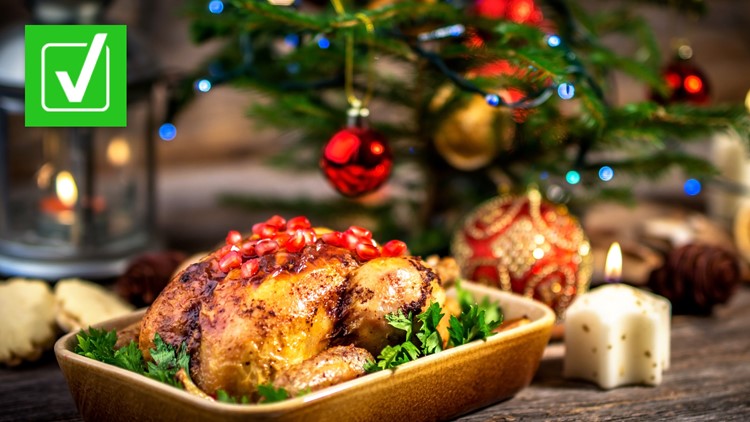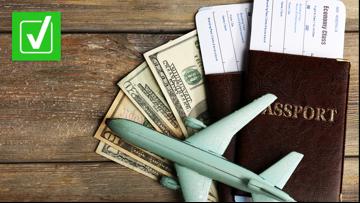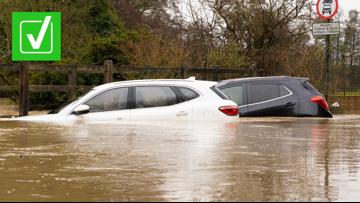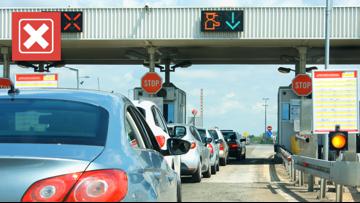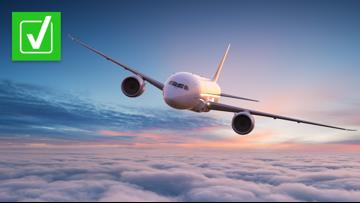With the holidays in full swing, millions of Americans will be traveling to visit family and friends.
AAA projects 7.5 million people will travel by airplane in the 2023 Christmas and New Year season and some of them may be bringing their own homemade goodies.
Google trends data shows that many people are wondering whether they can bring food with them through airport security.
THE QUESTION
Are you allowed to bring homemade holiday food on a flight?
THE SOURCES
THE ANSWER
Yes, you are allowed to bring homemade holiday food on a flight.
WHAT WE FOUND
You can bring homemade holiday food on a flight, but you might need to put some in your checked luggage. The Transportation Security Administration (TSA) says there are certain homemade food items that can be carried through security and others that need to be in your checked bag.
If it’s a solid item, then it can go in your carry-on.
“However, if you can spill it, spread it, spray it, pump it or pour it, and it’s larger than 3.4 ounces, then it should go in a checked bag,” the TSA says.
That is because the TSA implements the 3-1-1 rule, a guideline for airline passengers regarding the transportation of liquids or gels. Each passenger can bring liquids or gels in 3.4-ounce or less containers in a single quart-sized bag with a limit of one bag per person. The liquids can be taken through security if the passenger follows those guidelines.
Anything larger than that has to go in a checked bag.
Here are some examples of solid foods that can be carried on and go through TSA security checkpoints:
- Homemade or store-bought pies, cakes, cookies, brownies and other sweet treats
- Turkey, chicken, ham and steak can be carried on frozen, cooked or uncooked
- Stuffing can be brought on a plane cooked, uncooked, in a box or in a bag
- Traditional green bean casseroles
- Mac ‘n cheese can be cooked in a pan or traveling with the ingredients to cook it at your destination
- Potatoes, yams, broccoli, green beans, Brussels sprouts, cauliflower, beets, radishes, carrots, squash, greens
- Apples, pears, pineapple, lemons, limes, cranberries, blueberries, strawberries, bananas, kiwi
- Candy
- Spices
Here are some examples of holiday foods that need to be packed in a checked bag:
- Homemade or canned cranberry sauces that are spreadable
- Homemade gravy packed in a jar or can
- Wine, champagne, sparkling apple cider
- Canned fruit or vegetables that have liquid in them
- Preserves, jams and jellies. They are spreadable, so best to check them.
- Maple syrup
For people bringing homemade food in your carry on, the TSA says you should bring in those items in an accessible location because these items may need some additional screening.
Lorie Dankers, a spokesperson for TSA, told VERIFY if you are packaging something to carry on a plane or in your checked luggage, you should pack it in something that doesn’t leak or contaminate the items inside the luggage.
“Otherwise you’re going to be wearing those for the next few days,” Dankers said.
People traveling should plan ahead and consider flight times when carrying homemade foods on a plane. The TSA says ice packs can be brought on board a plane through carry-on security checkpoints as long as they are completely frozen solid at the screening point. In checked bags, ice packs don’t have to be completely frozen.
This is helpful for people who need to keep their dishes cool. The Centers for Disease Control and Prevention (CDC) says perishable foods that contain meat, dairy and vegetables should be stored in a refrigerator within two hours. Bacteria can “multiply rapidly” at room temperature, or what is known as the “danger zone” between 40 degrees and 140 degrees.
If you have food that is strong-smelling, Dankers said you should consult the airline directly and ask. Airlines might have their own policies about odors.
Travelers can download the free myTSA app, which has a “What can I bring?” feature that allows you to type in the item to find out if it can fly. Or ask on Twitter or Facebook Messenger at @AskTSA. Travelers may send a question by texting “Travel” to AskTSA (275-872).

